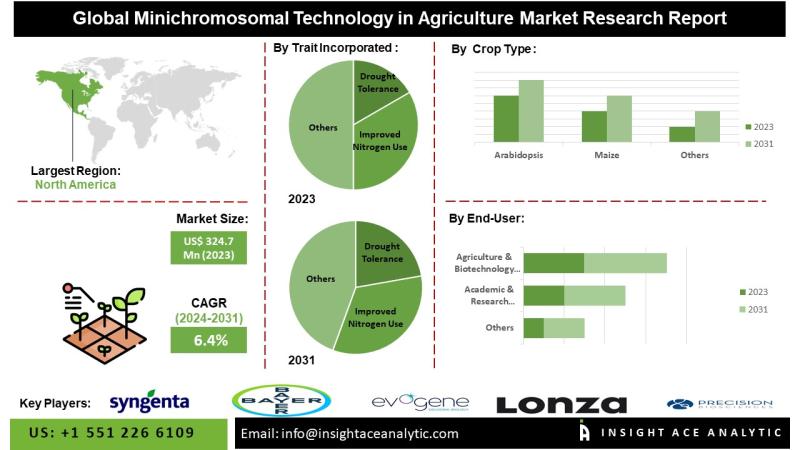Insightce Analytic PVT. Ltd. announces the published market evaluation report “Global mini-chromosome technology in the agricultural market (drawing (drought tolerance, improved nitrogen use, weed pesticide tolerance, pest residue, others), written by harvest type (arabidopssis, other), Biotechnology companies).
According to the latest study by Insightace Analytic, the value of the agricultural market global mini-chromosomal technology is $ 324.7 million in 2023 and is expected to rise to $ 526.6.6.6.631, and CAGR will be 6.40% for the forecast period 2024-2031.
Get free access to presentation report, Excel Pivot and TOC: https://www.insightaceanalytic.com/request-sample/2461
Minicromosomal technology represents an advanced approach in agricultural gene technology and utilizes artificial chromosomes to introduce new features into plants without changing their original genetic structure. The growing global population continues to put significant pressure on the agricultural sector to improve crop productivity. In response, mini -chromosomal technology has received considerable attraction globally to support this goal.
These synthetic chromosomes, which are compact and independent of the natural chromosomes of the plant, provide a versatile platform to integrate new genetic features. This enables the development of crops with improved properties such as improved nutritional content, overwhelming taste and improved structure. In addition, technology supports sustainable agricultural practices by reducing potentially harmful pesticides.
Of major actors in the agricultural market mini -chromosomal technology:
• Chromatin, Inc.
• ICon Genetics Inc.
• Evogene Ltd.
• Lonza Group AG
• Precision Biosciences, Inc.
Market dynamics:
Driver
Demand for mini -chromosomal technology in the agricultural sector is mainly due to the growing need to develop high -yielding, sustainable crops. This demand is further strengthened by the world’s population growth and the increasing effects of climate change. Minichromosomal technology allows for accurate placement of a number of useful features in crops without changing their original genome, thus maintaining genetic integrity between generations.
Questionnaire before buying:
https://www.insightaceanalytic.com/enquiry-before-buying/2461
Challenges:
Despite its potential, there are significant technical and financial barriers on the market. The integration and maintenance of artificial chromosomes into plant cells is a complex and resource -intensive process that requires advanced scientific expertise and significant investment. These factors restrict availability, especially for smaller organizations and institutions in developing countries.
Regional trends:
North America is expected to dominate agricultural global mini -chromosomial technology markets, supported by significant public investments in agricultural biotechnology and a strong focus on improving the efficiency of the industry through technological innovations. The area also benefits from a well -developed infrastructure and a favorable political environment. In contrast, there is a significant market share in Europe due to the awareness of the public surrounding food safety and sustainability, the financing of advanced biotechnological research and the implementation of comprehensive regulatory frameworks dominating the use of genetic engineering.
Recent Development:
• In April 2024 Evgn and Kitchen Foodtech Hub, the investment group of the Food Behemoth Strauss group in Israel, eventually reported Foods Ltd. -a joint start of the company. TKH is a leading computational biology company whose aim is to revolutionize the discovery of life -based products and development through highly advanced computing biology technology technologies.
• In January 2024 Denka Co. LTD’s 100%subsidiary GmbH, Tokyo, Japan, announced the award of the European Patent (EP3938378b1) of his innovation to the stable norovirus -like particles.
Open your GTM strategy:
https://www.insightaceanalytic.com/customisation/2461
Minichromosomal technology segmentation in agricultural market-
Minichromosomal technology in the agricultural market-
• Drought tolerance
• Improved nitrogen use
• Tolerance for weeds contrasts
• pest resistance
• other
Minichromosomal technology in the agricultural market- with the type of cultivation
• Arabidopsis
• corn
• other
Minichromosomal technology in the agricultural market- end-user
• Agricultural and biotechnology companies
• Academic and Research Institutes
• other
Minichromosomal technology in the agricultural market- by region
North American
• United States
• Canada
• Mexico
Europe-
• German
• The United Kingdom
• French
• Italy
• Spanish
• Other in Europe
Asian and Pacific
• China
• Japan
• India
• South Korea
• Southeast of Southeast
• Other Asian and Pacific region
Latin America-
• Brazil
• Argentina
• other Latin America
Middle East and Africa
• GCC countries
• South Africa
• Other nearby and Africa
Get more information:
https://www.insightaceanalytic.com/report/minichromosomal-technology-in-ongriculture-market/2461
About us:
Insightace Analytic is a market research and consulting company that allows customers to make strategic decisions. Our qualitative and quantitative market information solutions indicate the need for market and competitive information to expand its business. We help our customers get a competitive advantage by identifying unused markets, exploring new and competing techniques, segmenting potential markets and investment products. Our expertise is to provide intelligence reports for syndically and customized markets through a thorough analysis of the key market-eating in time and in a cost-effective way.https://www.insightaceanalytic.com/images_data/148861653.jpg
Contact:
info@insightaceanalytic.com
Insightce Analytic PVT. Ltd.
Visit: www.insightaceanalytic.com
Tel: +1 607 400-7072
Asia: +91 79 72967118
Follow us LinkedIn @ Bit.ly/2TBXSGS
Follow us on Facebook @ bit.ly/2h9jndz
Twitter: https://twitter.com/insightace
This publication was published at OpenPR.
